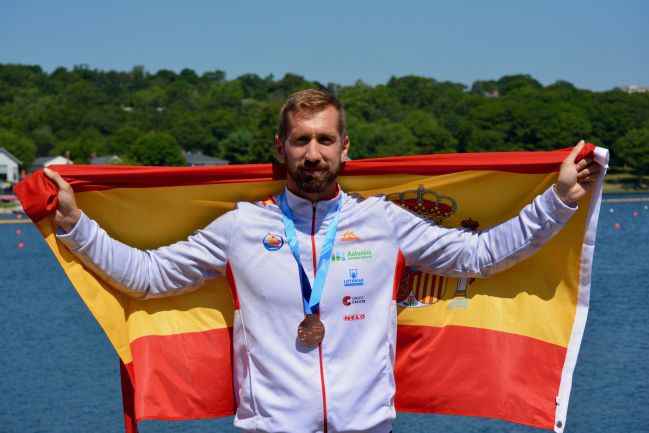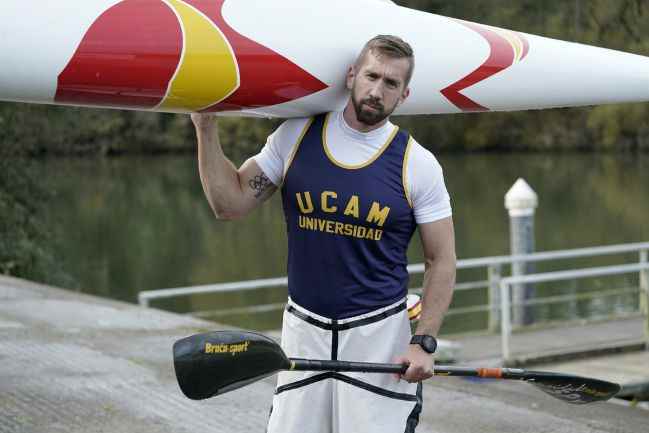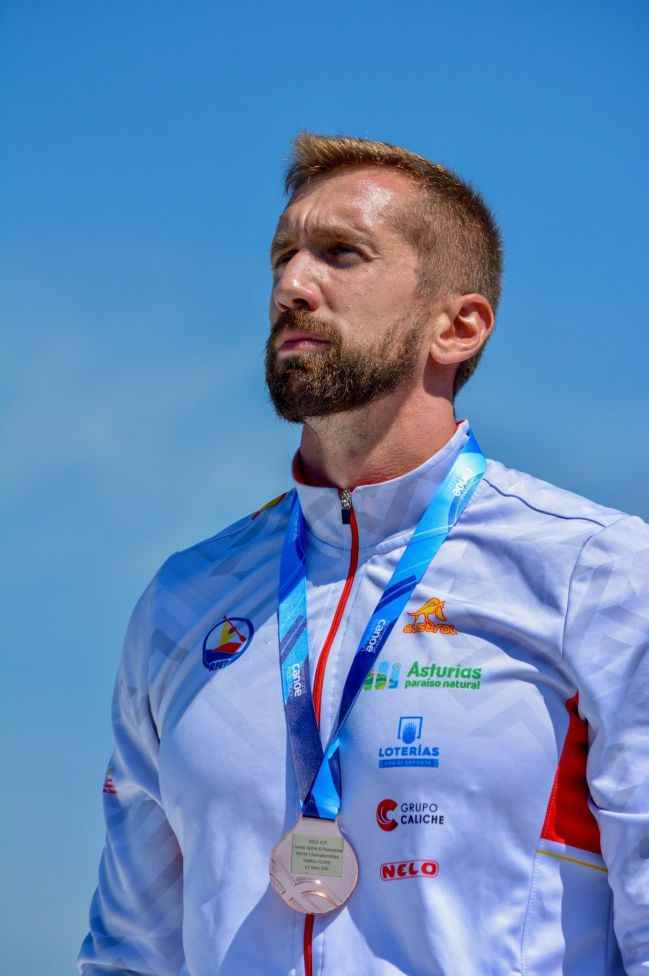By
Spanish canoeing has lived a dream 2022, with multiple joys that fill the backpack towards the Paris Games with hope. One of the most prominent names has been that of Carlos Arevalo (Betanzos, 28 years old), double champion in the sprint world championships held in Halifax (Canada) last August. The long-awaited gold in the K4 500, in which he shares a boat with Saúl Craviotto, Marcus Cooper and Rodrigo Germade, was accompanied by another in the K1 200. But the road to glory has not been easy for the Galician, who reconsidered everything after being left out of the Rio 2016 Olympic Games. After that, Arévalo found refuge in the Spanish Armed Forces, in which he occupies a position in the Infantry Regiment No. 3 of Cabo Noval, Asturias. With effort and never giving up, Carlos was able to remove the Olympic thorn in Tokyo, where he won silver in the K4 500. Now, he is one of the great Spanish assets for Paris 2024, an appointment to which he must qualify next year .
Question: How do you rate this 2022?
Answer: It’s been a great year. After going to the Games and having achieved the best result of my career, as well as having fulfilled the dream that it was, I started this year with great enthusiasm. I wanted to go eat the world, and it has been reflected in the results. It has been a very good year in which I have been very motivated, training very well as well.
It has also been his consecration by proclaiming himself a two-time world champion.
Being able to get two golds in a World Cup was incredible for me. I didn’t expect it at all, really. In the K4 500 I knew that we were working very well and that we had gold options, but in the K1 200 I didn’t imagine that I could win.

Enlarge
Carlos Arévalo, after the world gold in K1 200.
RFEP (DIARIO AS)
How did you experience those World Cup days in Canada?
What I was really 100 percent focused on was the K4, which is what I had trained for. We knew that the fight for gold and silver was going to be with Germany. I arrived at K1 without preparing it, it is not compatible to train that and K4 at the same time. In the end, I think that the change in paddling technique that we incorporated this year helped me a lot to improve the individual event. The days before competing I had total uncertainty, I was lost.
How has that change in paleo helped you?
After the Olympic Games we get together and value everything. One of the things we could improve the most was technique, which is fundamental in canoeing. We seek to lower the cadence of strokes with a better application of force in order to better reach the end. It is what we are going to be looking for facing Paris. We have already achieved big improvements in that aspect, and I have been able to transfer it very well to the K1. That may be the key to getting the gold in Paris.
He always speaks highly of his three shipmates: Saúl, Marcus and Rodrigo.
We have a perfect connection, impressive. It is riding in the canoe and everyone is focused on their own, we know what we have to do at all times and the confidence is absolute. That confidence is very important, it is what makes the difference. Going all together is very nice. Not only with the people who go inside the boat, but everyone who supports us from behind: my coach, my girlfriend, friends… Even the Armed Forces in my case. All of this forms a great family, a support that makes team sport more beautiful. Sharing it with colleagues is unique.
“The shift in paleo may be the key to gold in Paris”
Carlos Arevalo
What has been your roadmap from Canada?
Nothing has changed, I’m still focused on the main goal, which is the K4 500 at the Paris Olympics. That gold is what I have between my eyebrows, a dream. I already won a silver and I want more because I know that it can be obtained. We continue to insist a lot on the technical aspect, putting in a lot of training load. Next year we play qualifying for Paris in a single event. We are going to be training for a whole year so that we risk entering Paris in just over a minute. And there is only one chance. It is what we are focused on.
Having only one opportunity, and despite the fact that it may appear as a mere formality, the nerves will increase.
Totally. In the qualifying year there are more nerves than in the year of the Games. It is a very tense season because you risk everything in a test. This does not reward doing well in various competitions. That day, to give an example and touching wood so that it does not happen, our rudder cable breaks and we are out of the Olympic Games. And many other things can happen. That day is the day in which there is the most tension in the entire Olympic cycle, it is bad. At the Olympiad you are already calmer.

Enlarge
Carlos Arévalo, during a training session in Trasona (Asturias).
PACO PAREDES (AS DAILY)
Regarding the previous Olympic cycle, do you feel that now you are the big favorites thanks to the world gold?
What I notice the most is that it is getting fast, because three years fly by. But we cannot be trusted by gold, we must continue with our feet on the ground. It has been a year of changes in all the boats, we have tried new things, Germany too, the rest of the countries try new people… I don’t want to settle for anything, I want to keep improving and see what happens. I will not trust myself and I will never be sure.
Looking back, how do you remember missing out on the Rio Games?
It was a very hard time. You are four years in which you are young but already professional and focused on achieving a goal. Staying at the gates of achieving it is difficult. You have a life oriented towards it, 24 hours a day trying to make everything perfect… Being left out is a tremendous blow. That’s when I reconsidered many things in life, I wanted to find a way to turn things around to achieve an improvement that would make me continue fighting to fulfill my dream. I never wanted to dissociate myself from the sport, it is something that I love. I saw a great opportunity in the Armed Forces. There I learned values that I carry in my day to day such as camaraderie, respect, effort, sacrifice… It made me improve. I have nothing but words of gratitude for my other family.
“By staying out of Rio I reconsidered many things in my life”
Carlos Arevalo
How do you balance two such demanding professions?
I have to thank the Armed Forces, the Army, the Galicia VII Brigade, the Príncipe Regiment and, above all, the Higher Council for Military Sports. Everything is possible thanks to the support they give me and the trust they have in me. They give me permission to combine it, without it it would be unfeasible to continue with both professions. I am reconciling with the permits and aid that they give me. Much of the work that I do are talks in institutes and other places talking about sports and the military world, teaching the experiences that I live.
The fact of having another profession gives him peace of mind for the future.
That is the most important thing for an athlete. Many times we do not see that until we are outside, when you are already on the edge of the cliff and the fall can be very great. If you have security behind you, a job, and your sporting life suddenly ends, you have that peace of mind. And the race may not end due to bad results, it may be due to an injury, for example. But having trained in a profession in which you can continue for the rest of your life, and which is also something you are passionate about, is the best support an athlete can have. Especially for us, who belong to a minority sport. We have to be realistic and know that, once sport is over, we must return to working life because we cannot live on what we have earned from sport.
Who inspires you as an athlete?
Being able to row with Saúl Craviotto or Carlos Pérez, colleagues who have been Olympic medalists and who saw them as reference points as a child, is a dream come true and something that motivates you on a day-to-day basis. Sometimes I’m paddling and I think this is what I dreamed of when I was little. There is also a very good vibe and a great desire to do things well. Having colleagues like this is an incentive and pushes you to continue improving. When things go wrong we also support each other, it’s really like a family.

Enlarge
Carlos Arévalo listens to the Spanish anthem.
DAILY AS (DIARY AS)
Thinking of Paris, is it a plus of motivation to want to help Saúl Craviotto add another medal?
Of course. The one who will push for us will surely be him (Serie). Sharing a boat with the best athlete in the history of Spain is unique. Having in front of a person who has five Olympic medals, who has never failed… He’s very good, you can only see him training with him. If he gets his sixth medal it would be a milestone in the sport and I can be present at it, of course we want to contribute our bit. For me, it would be super nice.
Should you qualify for the Games, do you plan to also compete in the K2 500?
I am fully focused on the K4, which is the big goal. It could be doubled, as was done in Tokyo when we went out to K1 to see how we were doing and enter the competition. But we weren’t training him or focused on it. The objective is K4 and, if you can then go to K2, welcome.
What does the Galician quarry have that gives so many high-level canoeists?
The work that is being done both from the federations and from the Xunta in general is very good. There is also the geographical part, in Galicia we are linked to the sea and sports that have to do with water. In Betanzos I have a magnificent river and estuary for canoeing and the conditions favor it. It also helps to have such award-winning references as David Cal, Teresa Portela or Carlos Pérez. That leads a lot of kids to get into this.
A few weeks ago he had to sleep in a car after training. Is there a need for greater and better collaboration between the Spanish canoeing federations?
Yes, of course. Sometimes there are moments that are a bit embarrassing for us, who are high-level athletes. As athletes we cannot be thinking about how we are going to rest, where we are going to stay, what we have to do… We have to be focused on what is ours, which is training. For these other things there are federations, which have to agree among themselves and that these problems do not come to us. I, as an athlete, cannot be worried about where I am going to rest or eat. That cannot reach us and it is a problem that should not happen to us. I hope it doesn’t happen again, it was embarrassing, but I don’t want to get too into it.
As I know that the classification to Paris will tell me, what does it ask of 2023 other than that.
If we manage to improve the technical aspect that I mentioned before and make a leap in quality, for me it would be a very important achievement and a wish fulfilled.
